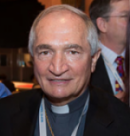Geneva: Vatican Nuncio addresses UN on climate change

Archbishop Tomasi
At the 68th World Health Assembly meeting in Geneva, Switzerland, Apostolic Nuncio Archbishop Silvano M Tomasi cs, gave an address in which he discussed the respect and protection of nature, technology, and the role of various nations in health and environmental issues.
The full text follows;
Remarks by His Excellency Archbishop Silvano M. Tomasi, c.s., Apostolic Nuncio and Permanent Representative of the Holy See to the United Nations and Specialized Agencies in Geneva at the Technical Briefing on "Climate and Health" 68th World Health Assembly, Geneva, Switzerland.
Mme. Chairperson,
It is a great honour to address this distinguished panel and audience on a topic of such urgent importance, not only to the technical and scientific community but to all people now living on our planet and, most especially, to the future generations who will follow in our footsteps.
The moral imperative to respect and protect nature is not a new topic for faith traditions. The Jewish and Christian Scriptures are replete with such exhortations, and most of the major religious traditions offer similar commandments. Man is not the owner of creation but its steward. In more recent times, the leadership of the Catholic Church has publicly and forcefully expressed concern about the damage to nature being caused by a privileged few, while the health and overall wellbeing of the vast majority of humans is being threatened through no fault of their own. Pope Benedict XVI, expressed such grave concern on this issue that he was popularly labelled as the "green Pope". Pope Francis continued this tradition and has encouraged a more profound reflection on this global concern. I am sure you are well aware already of the ongoing preparation of a special teaching document on climate justice, about which United Nations Secretary General, Ban Ki-moon, said: "I very much look forward to the upcoming encyclical by Pope Francis. It will convey to the world that protecting our environment is an urgent moral imperative and a sacred duty for all people of faith and people of conscience. It is critically important that people and their leaders hear your strong moral voice in the coming months."
In this regard, on 28 April 2015, the Holy See exercised its convening capacity, to gather Religious Leaders, Political Leaders, Business Leaders, Scientists and Development Practitioners, at the Vatican, in a workshop on the theme: "Protect the Earth, Dignify Humanity: The Moral Dimensions of Climate Change and Sustainable Humanity." This historic event was organized by the Pontifical Academy of Sciences, the Pontifical Academy of Social Sciences, the Sustainable Development Solutions Network, and Religions for Peace.
These religious leaders and technical experts left no further room for denial under the mistaken guise of so-called religious belief when they declared that human-induced climate change is a scientific reality. They acknowledged the "very vital role" played by religions through their affirmation of "the inherent dignity of every individual linked to the common good of all humanity" as well as "the beauty, wonder, and inherent goodness of the natural world." They proclaimed as "our moral duty to respect rather than ravage the garden that is our home." They noted the particular vulnerability experienced by poor and excluded people who are menaced by "dire threats from climate disruptions, including the increased frequency of droughts, extreme storms, heat waves, and rising sea levels."
The workshop participants expressed confidence that the world possesses the "technological grasp, financial means, and know-how to mitigate climate change while also ending extreme poverty, through the application of sustainable development solutions including the adoption of low-carbon energy systems supported by information and communications technologies." They begged the world to "take note that the climate summit in Paris later this year (COP21) may be the last effective opportunity to negotiate arrangements that keep human- 2 induced warming below 2-degrees C, and aim to stay well below 2-degrees C for safety, yet the current trajectory may well reach a devastating 4-degrees C or higher."
Ladies and gentlemen, I cannot end this brief intervention without emphasizing the special responsibility that must be assumed by those living in high-income countries to join in solidarity with the global human family as we attempt to repair the damage already done to our environment, prevent further degradation, and preserve the integral link between health and development. The citizens of wealthier countries cannot ignore but concretely express their solidarity with the poor, both at home and overseas. They have a special obligation to help their fellow men in developing countries to cope with climate change by mitigating its effects and by assisting with adaptation. There much evidence that shows how climate change can be devastating for health, especially among the world's poorest and most vulnerable people. Healthcare is foundational to integral human development and human flourishing. Allow me to conclude with these words of Pope Francis , whose insight is shared by Buddhists, Muslims, Hindus and most religions: "Creation is not a property, which we can rule over at will; or, even less, is the property of only a few: Creation is a gift, it is a wonderful gift that God has given us, so that we care for it and we use it for the benefit of all, always with great respect and gratitude."
See also: Statement of the Joint PAS/PASS Workshop on Sustainable Humanity, Sustainable Nature: Our Responsibility, 28 April 2015, Vatican City, www.pass.va/content/scienzesociali/en/events/2014-18/sustainable/statement.html















